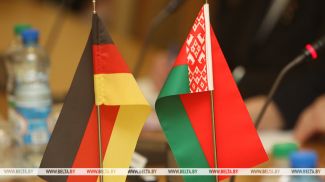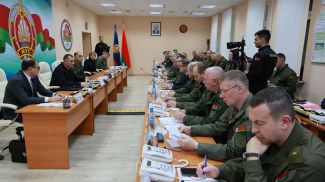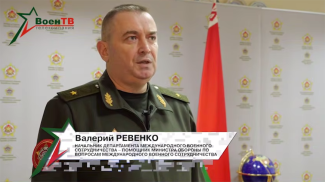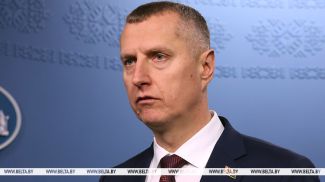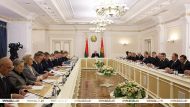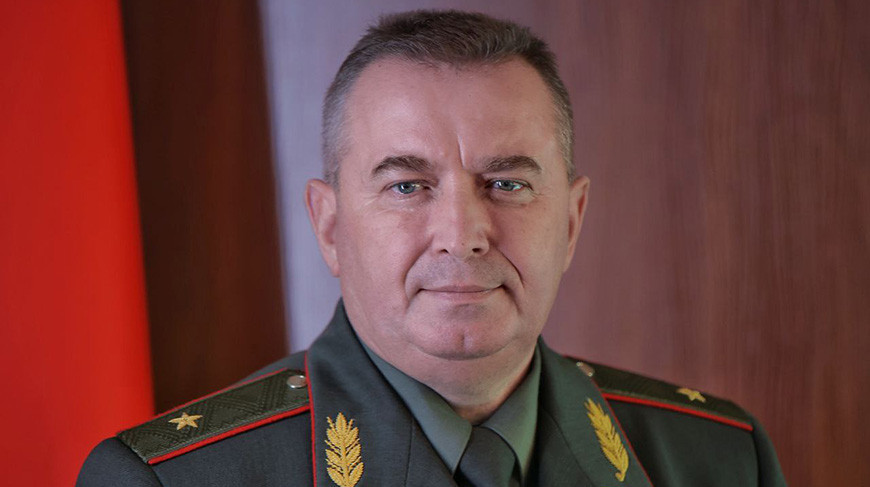
MINSK, 18 September (BelTA) – Restoring trust in the region is impossible without practical actions, Major-General Valery Revenko, Chief of the International Military Cooperation Department, Aide for International Military Cooperation to the Belarusian Defense Minister, said in a statement, BelTA learned from the Defense Ministry.
“For a long time now, discussions at various levels have suggested that conventional arms control mechanisms in Europe are not working. At the same time, absolutely all states of the collective West are expressing concern about the tense political and military situation in the OSCE area. We have also heard loud statements about the readiness to make every effort to normalize the situation. In our opinion, the Vienna Document 2011 on confidence- and security-building measures, the existing regional agreements between Belarus and Latvia, Lithuania, and Poland contain the necessary tools that, should our Western colleagues wish, could be used today for a gradual return to a substantive dialogue on security problems in the region. It is impossible to restore trust without practical actions. Such actions are necessary, first of all, with regard to operational and combat training activities, the intensity and scale of which have increased significantly,” Valery Revenko emphasized.
Valery Revenko said that a series of the Defender multinational exercise took place in Europe in the spring of 2024. Observers attended the largest of them. Despite the fact that the number of participants in the exercises exceeded 13,000 people, Belarus was not invited to observe them. This was a flagrant violation of the Vienna Document.
Representatives of Belarus were also not invited to the ongoing multinational tactical exercise Namejs. “Initially, up to 14,000 servicemen were announced to participate in the exercise. However, the number of participants was later adjusted to 11,000, which is also a high figure, especially given the current military and political situation. On the one hand, Latvia continues to fulfill its obligations under the Vienna Document in terms of sending notification on the largest military activity to all participating states. On the other hand, it is regrettable that representatives of Belarus were not invited to observe the active phase of the Namejs, whereas the observation was organized by the Latvian side and representatives of five states were invited. This event, held for a 'exclusive membership club' of elected states, is unlikely to contribute to the much-needed strengthening of confidence and security,” Valery Revenko said.
According to him, a natural question arises: should Belarus continue the practice of inviting foreign observers when it hosts large-scale operational and combat training events? “We express the hope that by undertaking the objective assessment of the possibilities of the Vienna Document and regional confidence-building and security measures, the states bordering Belarus and other countries will make the only right decision and return to pragmatic dialogue. We are confident that many acute issues related to the activities of the armed forces in general and in the border areas in particular will be resolved. Belarus continues to take consistent steps to reduce tension and prevent another regional conflict. Will our European neighbors realize all the possible consequences of their destructive policy? The question remains open,” Valery Revenko summarized.
“For a long time now, discussions at various levels have suggested that conventional arms control mechanisms in Europe are not working. At the same time, absolutely all states of the collective West are expressing concern about the tense political and military situation in the OSCE area. We have also heard loud statements about the readiness to make every effort to normalize the situation. In our opinion, the Vienna Document 2011 on confidence- and security-building measures, the existing regional agreements between Belarus and Latvia, Lithuania, and Poland contain the necessary tools that, should our Western colleagues wish, could be used today for a gradual return to a substantive dialogue on security problems in the region. It is impossible to restore trust without practical actions. Such actions are necessary, first of all, with regard to operational and combat training activities, the intensity and scale of which have increased significantly,” Valery Revenko emphasized.
Valery Revenko said that a series of the Defender multinational exercise took place in Europe in the spring of 2024. Observers attended the largest of them. Despite the fact that the number of participants in the exercises exceeded 13,000 people, Belarus was not invited to observe them. This was a flagrant violation of the Vienna Document.
Representatives of Belarus were also not invited to the ongoing multinational tactical exercise Namejs. “Initially, up to 14,000 servicemen were announced to participate in the exercise. However, the number of participants was later adjusted to 11,000, which is also a high figure, especially given the current military and political situation. On the one hand, Latvia continues to fulfill its obligations under the Vienna Document in terms of sending notification on the largest military activity to all participating states. On the other hand, it is regrettable that representatives of Belarus were not invited to observe the active phase of the Namejs, whereas the observation was organized by the Latvian side and representatives of five states were invited. This event, held for a 'exclusive membership club' of elected states, is unlikely to contribute to the much-needed strengthening of confidence and security,” Valery Revenko said.
According to him, a natural question arises: should Belarus continue the practice of inviting foreign observers when it hosts large-scale operational and combat training events? “We express the hope that by undertaking the objective assessment of the possibilities of the Vienna Document and regional confidence-building and security measures, the states bordering Belarus and other countries will make the only right decision and return to pragmatic dialogue. We are confident that many acute issues related to the activities of the armed forces in general and in the border areas in particular will be resolved. Belarus continues to take consistent steps to reduce tension and prevent another regional conflict. Will our European neighbors realize all the possible consequences of their destructive policy? The question remains open,” Valery Revenko summarized.






